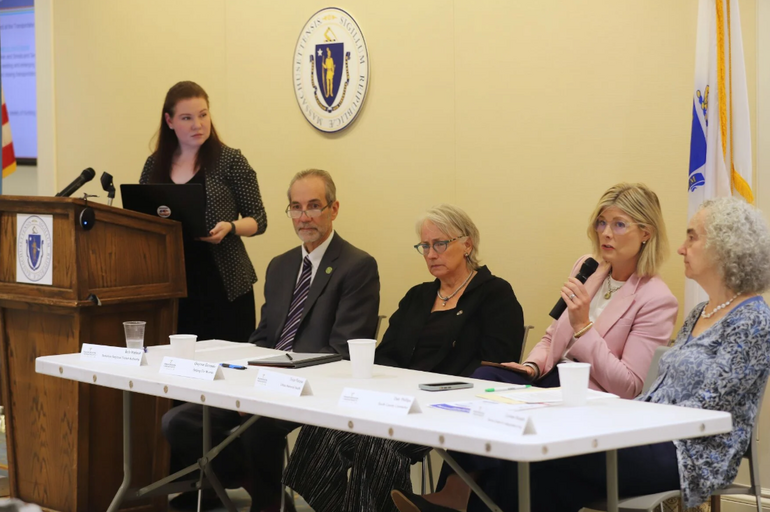Rural advocates seek more stand funding for microtransit options
 Photo | Courtesy of State House News Service
[Left to right] Commonwealth Beacon reporter Jennifer Smith moderates a discussion with panelists Berkshire Regional Transit Authority Administrator Robert Malnati, executive director of Cape Cod nonprofit Helping Our Women Gwynne Guzzeau, Tricia Pistone of UMass Memorial Health, and Deb Phillips of the South County Connector in the southern Berkshires.
Photo | Courtesy of State House News Service
[Left to right] Commonwealth Beacon reporter Jennifer Smith moderates a discussion with panelists Berkshire Regional Transit Authority Administrator Robert Malnati, executive director of Cape Cod nonprofit Helping Our Women Gwynne Guzzeau, Tricia Pistone of UMass Memorial Health, and Deb Phillips of the South County Connector in the southern Berkshires.
As the state pours billions of dollars into the MBTA and Boston-area public transportation, rural lawmakers and advocates want more support for "microtransit" — flexible, on-demand ride services that connect residents in remote areas to work, health care and basic services.
Supporters gathered Wednesday to back bills (S 2366 / H 3658 / H 4054) that would invest in microtransit systems, which use vans or other multi-passenger vehicles to serve communities where fixed-route buses and trains are limited or nonexistent.
"When I hear equity in transportation, I get all salty about how much money goes to the MBTA and how much does not go into the rest of the state," said Rep. Tricia Farley-Bouvier of Pittsfield, a lead sponsor of one of the bills. "If we just had a small percentage of that consistency and sustainability, we could transform our regions."
Microtransit services operate in parts of the state — sometimes through Regional Transit Authorities, other times independently — but advocates say they are underfunded and overstretched.
The South County Connector, operated by the town of Great Barrington, provides on-demand rides across seven towns in southern Berkshire County. Riders schedule trips through a mobile app, paying $2 to $5 per ride. The service averages 2,200 to 2,500 rides per month.
"The people who live in rural areas often have one car for the family," said Deb Phillips of the Connector. "Car goes off for the day; whoever's home doesn't have transportation."
She said people who want to work often cannot get jobs outside their homes, because they can't guarantee transportation. Young people also can't get outside of their houses after school or during the summer.
"So it really is a way to combat everything from access to health care, access to employment, access to education and combat social isolation," Phillips said.
However, funding is largely earmarked for seniors and people with disabilities, since the service is built on Council on Aging infrastructure. That means others — including working adults and teens — can lose their rides if a higher-priority need arises.
"If you were counting on a ride to get to work, and you get bumped because someone needs to get to the doctor — even if it’s three days ahead of time — you may not be able to find another way," Phillips said.
Restaurants sometimes can’t open because of staff cancellations, she said, and people leaving work late walk miles home in the dark on unsafe roads.
Phillips said they need more funding to make the service a more viable option for all community members.
In central Massachusetts, the Quaboag Connector has shown strong returns.
An analysis by the UMass Donahue Institute found that the service, which operates across nine towns, has generated $45 million in total economic benefits since 2017.
That is an $11 million return on investment for every $1 million put in, researcher Branner Stewart said.
"An 11-to-1 return on investment — we don't see return on investment at that level. And so we know that this concept has been proven," Farley-Bouvier said. "Now we need to find a way to make sure it's sustainable."
Farley-Bouvier and sponsors Rep. Todd Smola and Sen. Julian Cyr — the trio covering the remote areas of the Berkshires, Hampden County and the Cape and islands — back a bill to create a short-term commission that would study microtransit services statewide and recommend sustainable funding models to the Legislature.
Farley-Bouvier and Smola acknowledged that commissions can stall the progress of an idea in the Legislature, but said they thought this process would give microtransit funding its best shot.
"I hate the word commission, by the way,” Farley-Bouvier said. "But let’s get together a small group, short timeline, to say: This is what the funding should look like. These are what our definitions should be. These are what our standards are going to be, and this is what our funding source is going to look like. And then we're going to take the next step to make sure this gets funding."
Smola, the ranking minority member of the House Ways and Means Committee, said consistent funding is critical.
"At the end of the day, [grants] are not consistent," he said. "And that is the killer when it comes to these regional transportation gaps that so many of our constituencies are facing. So we need to have a better model. The intent of this commission is to lay the foundation for that."
The bill has a hearing next Tuesday before the Joint Committee on Transportation.









0 Comments